You’ll want to focus on devices that use advanced ECG sensors and heart rate variability analysis rather than basic photoplethysmography for accurate stress-rest tracking. The Samsung Galaxy Watch 7 leads with AI-powered health monitoring, while the Oura Ring 4 offers discreet 24/7 tracking through 18 signal pathways. Garmin’s Venu and Forerunner 965 excel at fitness-focused stress analysis, and Samsung’s Galaxy Ring provides extensive sleep environment optimization. Each device below reveals specific features that’ll transform your recovery insights.
Samsung Galaxy Watch 7: AI-Powered Sleep and Stress Analysis
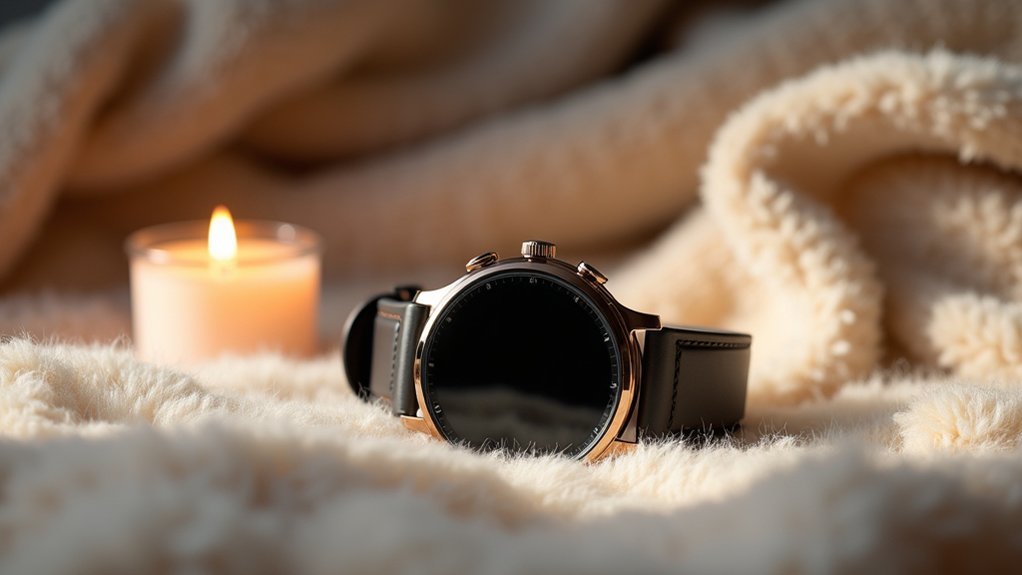
When you’re looking to understand the connection between your stress levels and recovery needs, Samsung’s Galaxy Watch 7 delivers extensive insights through its AI-powered health monitoring system.
The watch continuously tracks your stress using physiological sensor data while automatically monitoring sleep stages without requiring manual input.
The watch seamlessly monitors your physiological stress indicators and sleep cycles throughout the day and night without any user intervention required.
What sets this wearable apart is its Energy Score feature, which calculates your daily physical readiness on a 0-100 scale by analyzing your previous night’s sleep quality and prior day’s activity.
When your Energy Score drops, the AI provides personalized recommendations like reducing activity levels or prioritizing rest.
The upgraded BioActive sensor captures precise heart rate, sleep patterns, and stress measurements, while new sleep apnea detection monitors breathing disturbances.
All data syncs with Samsung Health for thorough trend tracking. The watch also offers Wellness Tips based on your collected health insights to help optimize your individual stress management and recovery routine.
Oura Ring 4: Comprehensive Biometric Tracking With Smart Sensing
If you prefer a discreet wearable that doesn’t compromise on advanced health monitoring, the Oura Ring 4 delivers extensive biometric tracking through its revolutionary Smart Sensing technology.
With 18 signal pathways—more than double the previous generation’s eight—you’ll get precise heart rate variability monitoring, blood oxygen tracking, and temperature detection around the clock.
The ring’s daytime stress monitoring analyzes HRV fluctuations, temperature variations, and activity patterns to signal when you need rest or self-care.
Its adaptive algorithm balances stress and recovery data for personalized guidance.
You’ll appreciate the eight-day battery life, fully titanium construction, and recessed sensors that enhance comfort during 24/7 wear. The sensors sit at 0.3mm depth, creating a smoother interior surface compared to previous generations’ raised sensor domes.
The redesigned app dashboard makes your stress-rest insights easily accessible and actionable.
Samsung Galaxy Ring: Advanced Sleep Environment Optimization
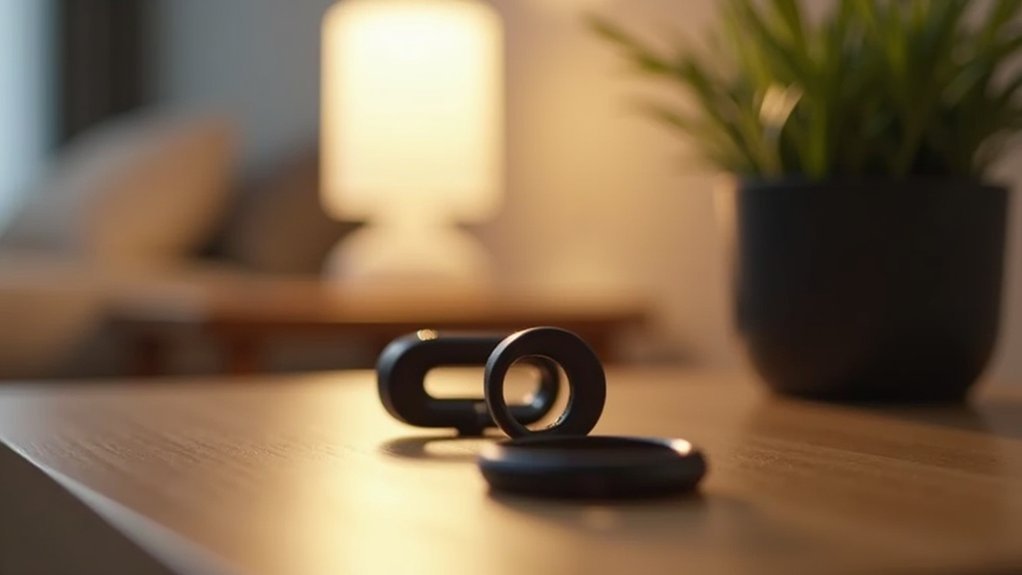
You’ll discover that Samsung’s Galaxy Ring takes sleep tracking beyond basic metrics by generating detailed Sleep Environment Reports that analyze how your surroundings impact rest quality.
The device monitors skin temperature, blood oxygen levels, and heart rate variability to detect environmental disruptions affecting your sleep cycles. The Galaxy Ring’s snore detection feature records audio during sleep to identify breathing pattern disruptions that may indicate sleep quality issues.
Through its Mindfulness Monitor Integration with Samsung Health, you’ll receive personalized recommendations that connect stress patterns with sleep environment factors, helping you optimize both your physical space and mental state for better recovery.
Sleep Environment Report Features
Samsung’s Galaxy Ring transforms your bedroom into an intelligent sleep sanctuary through its extensive Sleep Environment Report feature.
You’ll receive detailed analysis of temperature, humidity, light exposure, and noise levels that affect your sleep quality. The ring detects disturbances including snoring and measures environmental consistency across nights.
Through SmartThings integration, you can automatically adjust thermostats, lighting, and other smart home devices without manual intervention.
The system correlates your sleep stages with environmental metrics, pinpointing specific problem areas that disrupt rest. A mindfulness tracker helps manage mood, breathing, and stress levels alongside your sleep optimization efforts.
You’ll get personalized bedtime recommendations and actionable insights for optimizing your sleeping space.
The May 2025 software update enhances these capabilities, requiring Samsung Health app version 6.29.5+ for full functionality and seamless environmental management.
Mindfulness Monitor Integration
Beyond environmental tracking, the Galaxy Ring’s BioActive sensor transforms stress management through real-time physiological monitoring that connects your mental state to sleep quality.
The ring combines optical heart rate, electrical heart monitoring, and bioelectrical impedance analysis with infrared temperature sensing to continuously track stress indicators throughout day and night.
You’ll receive personalized breathing exercises through Samsung Health when stress spikes occur, with custom reminders integrating mindfulness into your routine.
The system analyzes heart rate variability and skin temperature fluctuations to provide real-time stress measurements, feeding data into AI-powered Energy Scores that guide recovery planning. The comprehensive Energy Score provides analysis based on heart rate, activity level, and sleep data to deliver personalized wellness insights.
Silent haptic feedback guarantees non-disruptive notifications during rest periods, while seamless smartphone integration creates a thorough wellness dashboard tracking your stress-rest patterns for actionable insights.
Huawei Band 10: Heart Rate Variability and Arrhythmia Detection
When monitoring your stress and recovery patterns becomes essential, the Huawei Band 10 delivers extensive heart rate variability tracking that transforms how you understand your body’s responses.
You’ll benefit from continuous HRV analysis that evaluates your stress and recovery states throughout both day and night cycles.
The device’s 9-axis IMU sensor works with optical heart rate monitoring to detect irregular heartbeats and potential arrhythmia patterns.
While it doesn’t provide clinical-grade diagnosis, you’ll receive basic alerts for abnormal heart rhythms through the Huawei Health app.
TruSleep technology leverages HRV insights to track your sleep stages and quality, creating extensive wellness patterns. The compact device weighs just ~15 g without the strap, ensuring comfortable wear during extended monitoring periods.
The always-on monitoring supports detection of autonomic balance changes, helping you understand how stress affects your recovery without frequent charging interruptions.
Garmin Venu: Fitness-Focused Stress and Recovery Monitoring
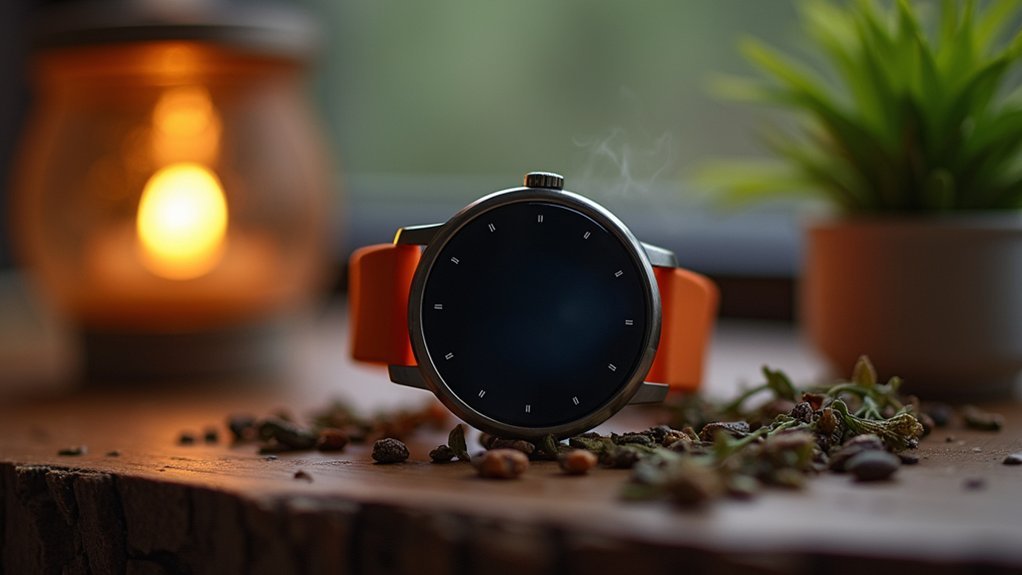
Garmin’s Venu takes an all-encompassing approach to stress and recovery monitoring by integrating heart rate variability analysis with fitness-specific metrics that serious athletes demand. You’ll get real-time stress readings through HRV measurements, displayed as color-coded bars that differentiate between rest periods and stress spikes throughout your day.
What sets the Venu apart is its Recovery Time feature, which calculates how long you need to rest before your next intense workout. This metric factors in your stress levels, sleep quality, and activity data to provide personalized recovery recommendations.
The Body Battery system shows how stress depletes your energy reserves, sending alerts when you need rest. The device also provides breathing exercises when it detects high stress levels to help you actively manage stress in the moment.
Body Battery technology monitors your energy depletion from stress and delivers timely rest alerts to optimize recovery.
You can access stress data through simple swipe gestures and customize notifications to avoid alert-induced stress.
Garmin Forerunner 965: Athletic Performance and Rest Balance
While the Venu excels at thorough wellness tracking, the Forerunner 965 zeroes in on the precise stress-rest balance that competitive athletes need to optimize their training cycles.
You’ll get heart rate variability-based stress measurements that directly influence your recovery time estimates and training readiness scores. The Body Battery™ metric becomes particularly valuable here, integrating your sleep, stress, and activity data to show exactly how much energy you’ve got for your next workout.
You can track how lifestyle factors like sleep quality and alcohol affect your stress levels and recovery. The color-coded stress glance displays orange bars for stress periods and blue for rest, helping you time your workouts perfectly. When you need to actively manage elevated stress levels, you can initiate Breathwork directly from the stress level glance for guided relaxation sessions.
However, some users find the stress algorithm overly sensitive, occasionally showing elevated readings even during rest periods.
Key Features to Consider When Choosing Your Stress-Rest Tracker
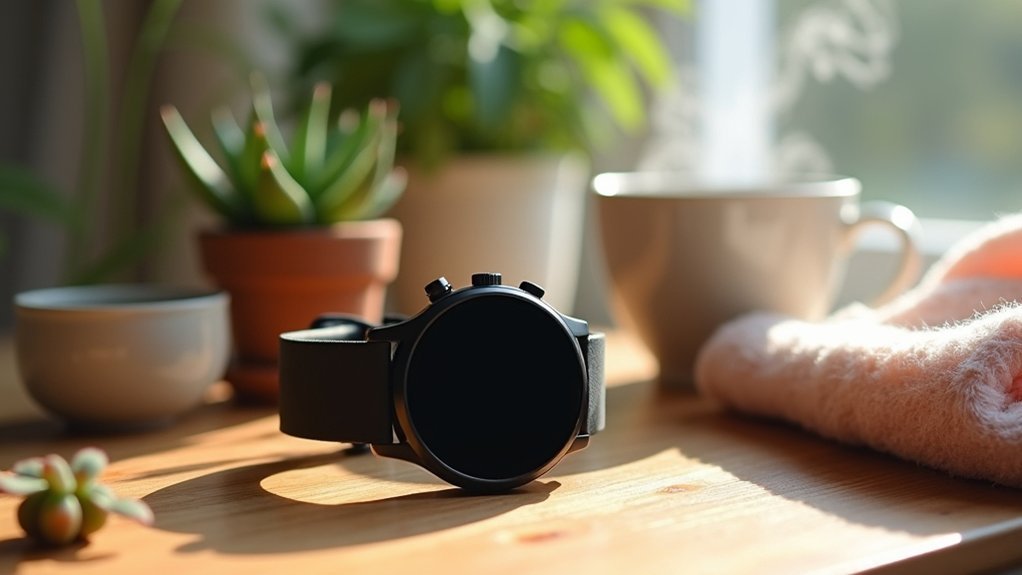
Beyond device-specific features, your choice of stress-rest tracker depends on several core capabilities that determine how effectively you’ll monitor and respond to your body’s signals.
You’ll want ECG sensor technology over basic photoplethysmography for superior stress measurement accuracy. Heart rate variability analysis becomes essential—look for devices offering time-domain, frequency-domain, and non-linear HRV methods.
ECG sensors and comprehensive HRV analysis across multiple domains provide the measurement precision essential for reliable stress tracking.
Battery life matters considerably since you need continuous 24/7 monitoring without charging interruptions. Choose wearables with multi-modal feedback systems providing visual, auditory, and tactile notifications for real-time stress awareness.
Advanced AI-driven algorithms should deliver personalized insights and energy scores combining sleep, recovery, and workout data. Many users find that devices providing raw data access without ongoing subscription fees offer better long-term value than those requiring monthly charges for detailed metrics.
Consider third-party app compatibility for expanded analysis capabilities, customizable alert thresholds preventing notification fatigue, and intuitive dashboards making complex metrics accessible across different user groups.
Frequently Asked Questions
How Accurate Are Wearable Stress Measurements Compared to Clinical Monitoring Devices?
You’ll find wearable stress measurements are less precise than clinical devices, with accuracy ranging from 61% to 94.55%. They can’t match clinical precision but offer convenient, continuous monitoring for everyday stress management.
Can These Wearables Detect Stress-Related Health Conditions Before Symptoms Appear?
Wearables can potentially detect stress-related conditions before symptoms emerge by monitoring early physiological changes like heart rate variability, sleep patterns, and skin temperature that predictably shift during stress buildup.
Do Wearables Work Effectively for People With Existing Heart Conditions?
Wearables work effectively for existing heart conditions by providing real-time monitoring of heart rate, blood pressure, and ECG data. You’ll receive alerts for irregular rhythms and can share detailed data with your doctors remotely.
How Long Does It Take to See Meaningful Stress-Rest Patterns?
You’ll typically see meaningful stress-rest patterns within 7-14 days of continuous monitoring. Your wearable needs at least one week of quality data to establish reliable trends and accurate stress-rest correlations.
Are There Privacy Concerns With Continuous Biometric Data Collection and Storage?
Yes, you’ll face significant privacy risks with continuous biometric monitoring. Your data can be re-identified within seconds, even when anonymized. You need strong encryption, clear consent policies, and secure storage practices.
In Summary
You’ll find that tracking your stress-rest connection transforms how you understand your body’s needs. Whether you choose the Galaxy Watch 7’s AI analysis, Oura Ring 4’s extensive metrics, or Garmin’s athletic-focused monitoring, you’re investing in better sleep quality and stress management. Don’t overlook heart rate variability and environmental factors when making your decision. The right wearable will help you optimize your recovery and maintain healthier daily rhythms.

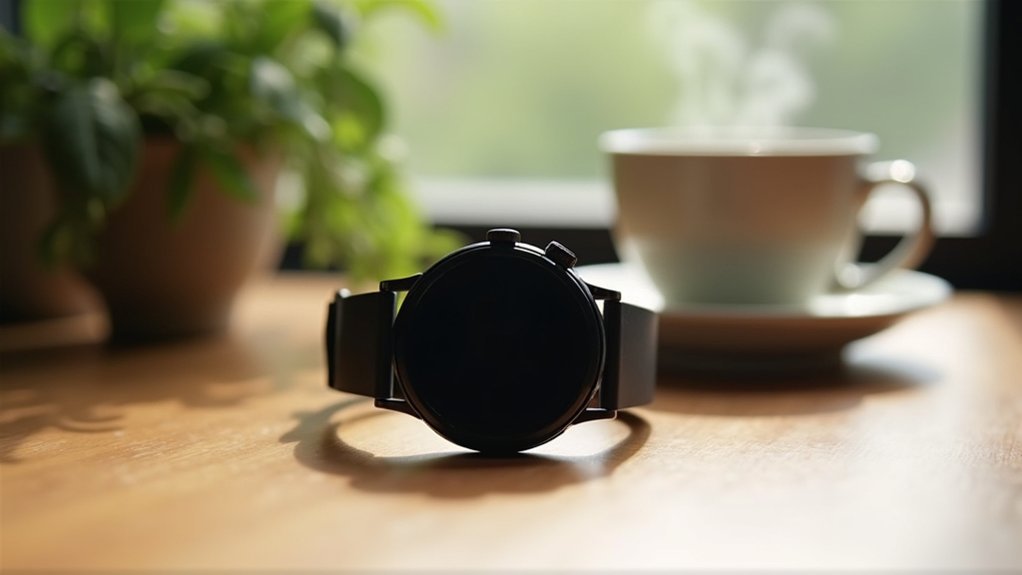
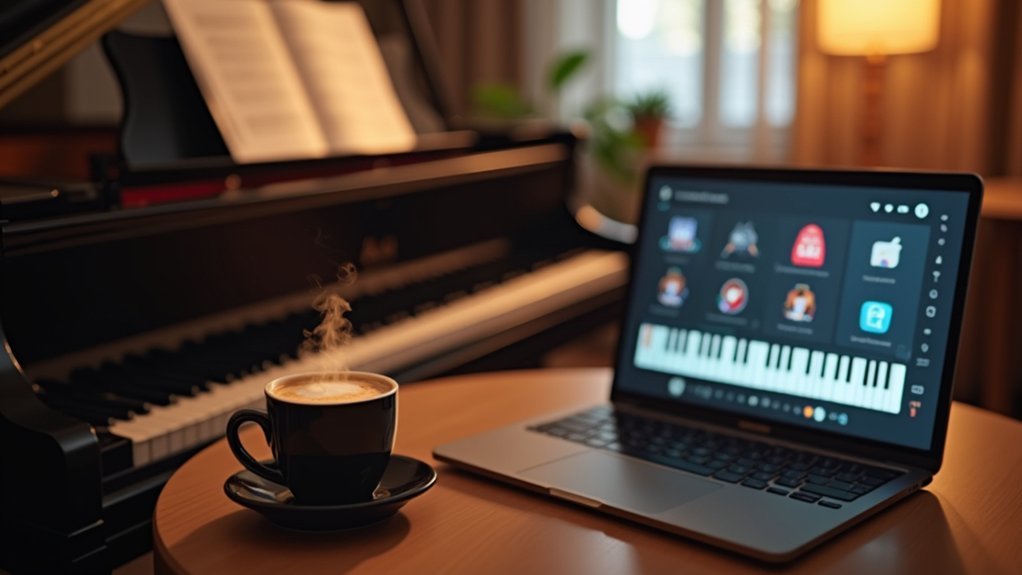
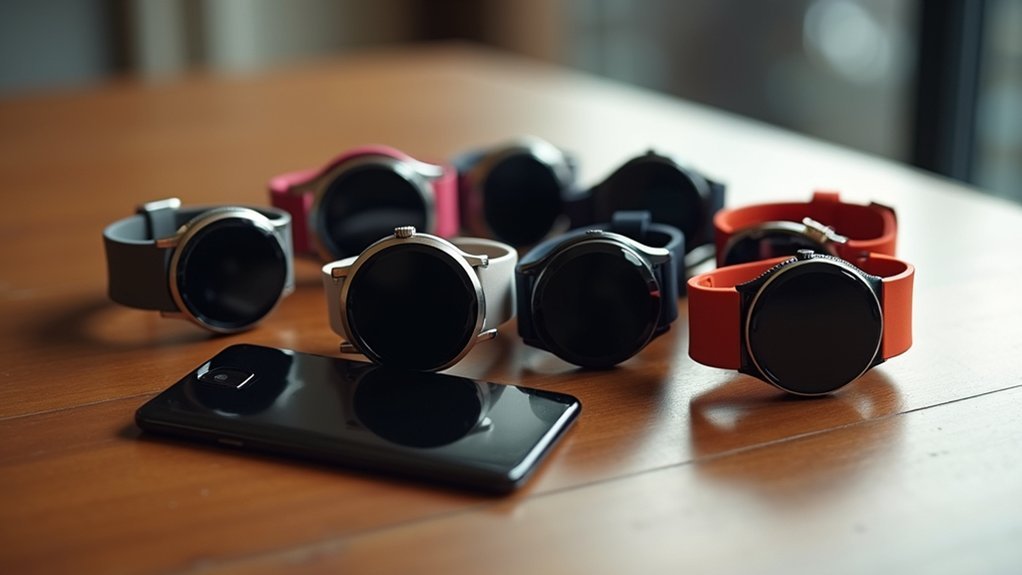
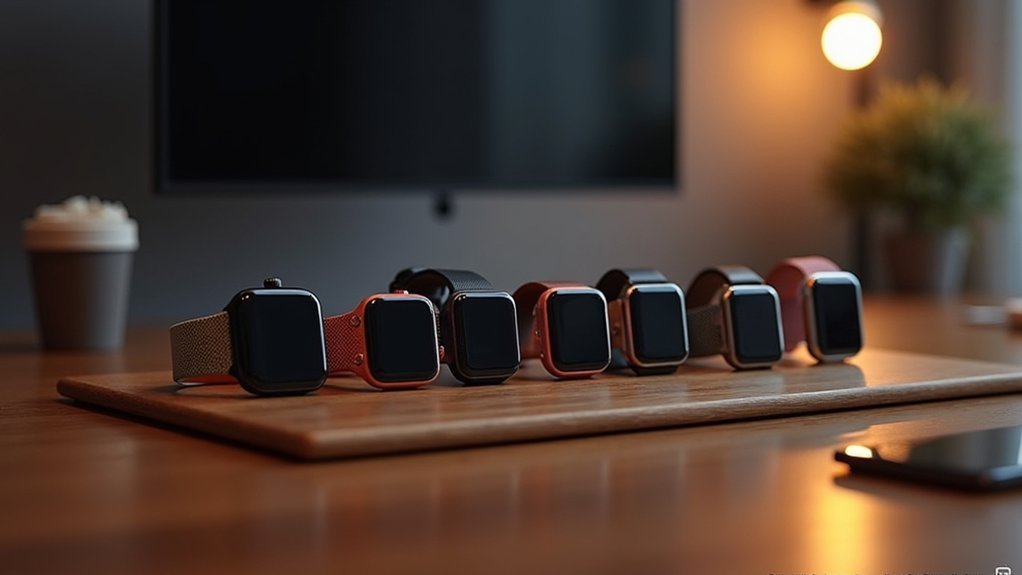
Leave a Reply